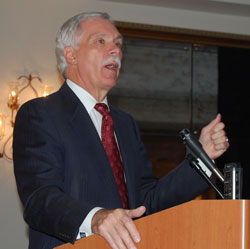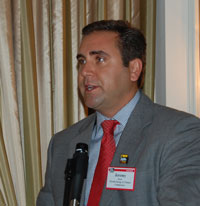 The Pontiac G6 will soon be E85 compatible. According to Automobilemag.com, among other changes, the model will soon be flexible fuel.
The Pontiac G6 will soon be E85 compatible. According to Automobilemag.com, among other changes, the model will soon be flexible fuel.
Upgrades to the current G6 will include a sportier front and rear fascias, inspired by the G8 design, a reimaging on the interior, and a better integration of the various entertainment and comfort options.
The G6 coupe will also have the option of receiving the four-cylinder 164 hp 2.4-liter Ecotec engine. The Ecotec engine provides improved fuel efficiency of 33 mpg. An E85-capable engine will also be offered in areas where the fuel is readily available. Still offered for the G6 is the optional 222-hp 3.9-liter V-6 for the G6 convertible as well as the standard 252-hp 3.6-liter V-6 for all GXP models.
“The G6 has always been one of our most important vehicles and has been Pontiac’s number-one seller since it was launched in 2004,” said Susan Docherty, vice president of Buick-Pontiac-GMC. “As the most complete family of mid-size vehicles available in the marketplace, the new enhancements for 2009 will further solidify the G6’s reputation for sporty style and handling without sacrificing value and fuel efficiency.”


 Speaking to members of the media after his speech, Schafer said the group that held a press conference yesterday calling for an end to ethanol subsidies “stood up there with no credibility whatsoever,” when they claimed that it will take 18-24 months for the lower commodity prices to bring food prices back down. “I just think that they are totally off base,” Schafer said. “They are trying to justify the increased cost and increased profits that they’re making at the expense of another industry and that’s just not appropriate.”
Speaking to members of the media after his speech, Schafer said the group that held a press conference yesterday calling for an end to ethanol subsidies “stood up there with no credibility whatsoever,” when they claimed that it will take 18-24 months for the lower commodity prices to bring food prices back down. “I just think that they are totally off base,” Schafer said. “They are trying to justify the increased cost and increased profits that they’re making at the expense of another industry and that’s just not appropriate.” Renewable energy sources are important to the U.S., especially during the upcoming period of holiday travel.
Renewable energy sources are important to the U.S., especially during the upcoming period of holiday travel. The newly-formed
The newly-formed  The “Food Before Fuel” group called the press conference today as the “30th anniversary of ethanol subsidies” and referred to ethanol as “30-year-old under employed child” living in our basement. During the Cellulosic Ethanol Summit in Florida,
The “Food Before Fuel” group called the press conference today as the “30th anniversary of ethanol subsidies” and referred to ethanol as “30-year-old under employed child” living in our basement. During the Cellulosic Ethanol Summit in Florida,  The U.S. Environmental Protection Agency (EPA) has reminded the petroleum industry that next year’s renewable fuel standard (RFS) is being stepped up, and the industry must be ready to comply.
The U.S. Environmental Protection Agency (EPA) has reminded the petroleum industry that next year’s renewable fuel standard (RFS) is being stepped up, and the industry must be ready to comply. Florida Commissioner of Agriculture Charles Bronson believes that Florida can be a leader in the production of cellulosic ethanol.
Florida Commissioner of Agriculture Charles Bronson believes that Florida can be a leader in the production of cellulosic ethanol.  As a cattle rancher by background, Bronson says he disagrees with some of his friends in the cattle industry. “They think that corn production is all being used up in the fuel, but it’s not,” Bronson said. “We’re producing more corn today than ever before in the United States so there is still plenty of corn left for humans and animals.”
As a cattle rancher by background, Bronson says he disagrees with some of his friends in the cattle industry. “They think that corn production is all being used up in the fuel, but it’s not,” Bronson said. “We’re producing more corn today than ever before in the United States so there is still plenty of corn left for humans and animals.”
 The third annual
The third annual  “We have an E10 standard by 2010,” said Susac. “Another initiative that we are very proud of is the Department of Agriculture’s Farm to Fuel to stimulate the agriculture community to grow our fuels, fuel out cars, enhance our economy and strengthen our energy security.”
“We have an E10 standard by 2010,” said Susac. “Another initiative that we are very proud of is the Department of Agriculture’s Farm to Fuel to stimulate the agriculture community to grow our fuels, fuel out cars, enhance our economy and strengthen our energy security.” The Governator wants his state to get more of its energy from renewable sources.
The Governator wants his state to get more of its energy from renewable sources.